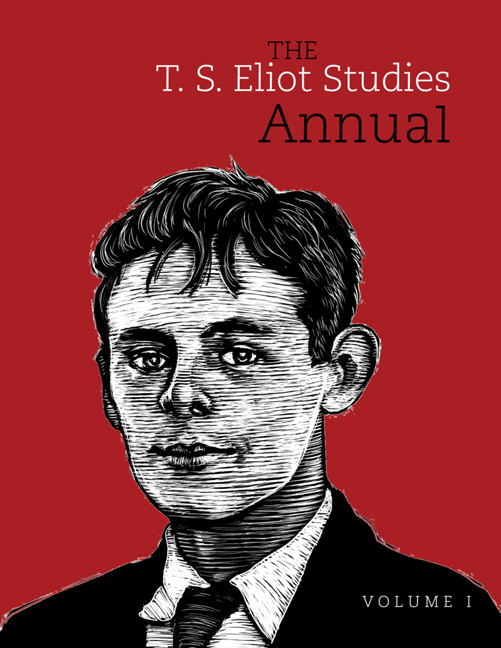Book contents
- Frontmatter
- Contents
- Abbreviations of Works
- General Editor's Note
- The Short and Surprisingly Private Life of King Bolo: Eliot's Bawdy Poems and Their Audiences
- Dull Tom-Tom's Absurd Prelude: Ludic Modernism in Early T. S. Eliot
- Eliot at Bergson's Lectures, 1910–1911
- The American Legacy of “Prufrock”
- Poetry (June 1915)
- The Stale Dregs of Revolt
- Prufrock, Belated
- Eliot's Allusive Legacy and Obscurity in “Prufrock”
- Transmuting F. H. Bradley: T. S. Eliot's Notes Towards a Theory of Poetry
- T. S. Eliot, Phenomenologist
- Astride the Dark Horse: T. S. Eliot and the Lloyds Bank Intelligence Department
- Aristophanic Structures in Sweeney Agonistes, “The Hollow Men,” and Murder in the Cathedral
- Eliot and Virgil in Love and War
- T. S. Eliot Bibliography 2014
- Notes on Contributors
Astride the Dark Horse: T. S. Eliot and the Lloyds Bank Intelligence Department
- Frontmatter
- Contents
- Abbreviations of Works
- General Editor's Note
- The Short and Surprisingly Private Life of King Bolo: Eliot's Bawdy Poems and Their Audiences
- Dull Tom-Tom's Absurd Prelude: Ludic Modernism in Early T. S. Eliot
- Eliot at Bergson's Lectures, 1910–1911
- The American Legacy of “Prufrock”
- Poetry (June 1915)
- The Stale Dregs of Revolt
- Prufrock, Belated
- Eliot's Allusive Legacy and Obscurity in “Prufrock”
- Transmuting F. H. Bradley: T. S. Eliot's Notes Towards a Theory of Poetry
- T. S. Eliot, Phenomenologist
- Astride the Dark Horse: T. S. Eliot and the Lloyds Bank Intelligence Department
- Aristophanic Structures in Sweeney Agonistes, “The Hollow Men,” and Murder in the Cathedral
- Eliot and Virgil in Love and War
- T. S. Eliot Bibliography 2014
- Notes on Contributors
Summary
In March 1922, Ezra Pound began circulating the Bel Esprit notice, soliciting pledges “in order that T. S. Eliot may leave his work in Lloyds Bank and devote his whole time to literature.” The Bel Esprit campaign was inspired by The Waste Land, which Pound was concurrently propelling through its lengthy revision process. Pound promised potential donors that it was “possibly the finest [series of poems] the modern movement in English has produced.” Because Eliot produced portions of The Waste Land while on a leave of absence from the bank in late 1921, Pound cited it as proof “that [Eliot's] bank work has diminished his output of poetry.” Twentieth-century critics leaned heavily on Pound's account in Bel Espirit, as well as other suspect anecdotal evidence, to characterize Eliot's career at Lloyds. If mentioned at all, Eliot's banking has most often been treated as either a trivial biographical detail or a tragic waste of the poet's productive prime.
More recently, scholars have recognized, as Michael Levenson puts it, “we certainly misread both Eliot's modernity and his urbanity if we ignore his role as a practitioner of economics, working amid various subtle currencies.” Levenson, Paul Delany, Adam Trexler, and Lawrence Rainey have made important investigations into Eliot's education in political economy, his publishing contracts, and his personal finances. Each acknowledges that Eliot's economic opinions likely derived, at least in part, from his experiences as a banker, but as yet no scholar has offered a serious analysis of the various occupations Eliot held during his nearly eight years of employment at Lloyds, including, from at least 1922 onward, daily engagement in writing, editing, and publishing on the bank's behalf. Nor has there been any acknowledgement of the peculiar culture of Lloyds itself, an international trailblazer in interbellum banking. Lloyds actively fostered the intellectual and aesthetic pursuits of its employees in a fashion antithetical to the dispassionate bureaucratic automation of contemporary finance. Contrary to the myth propounded by Bel Esprit, in this essay I argue that Eliot did not conceive and compose The Waste Land and the other celebrated works of this period in spite of the bank, but, to the contrary, the peculiar perspective gained via such employment was essential to literature he produced contemporaneously.
- Type
- Chapter
- Information
- The T. S. Eliot Studies Annual , pp. 131 - 156Publisher: Liverpool University PressPrint publication year: 2017



